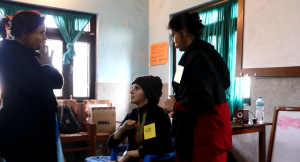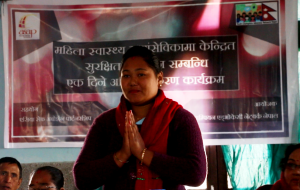TALKING ABOUT ABORTION WITH NEPAL’S FEMALE COMMUNITY HEALTH VOLUNTEERS
Small Grant Project
By Youth Champions Bidhya Basnet and Bonita Sharma
“A woman aged 45 with 3 children, told me she was two months pregnant and wanted an abortion. I referred her to a safe abortion clinic but she went to a local pharmacy instead and took 10 pills of medical abortifacients thinking the pregnancy would come out soon. Later on she suffered excessive bleeding and came to me seeking help. I immediately sent her to a health center through an ambulance for proper management. After a couple of days she shared with me that she felt guilty for ignoring my advice to go to a safe abortion site and also thanked me for helping her.”
This is a real story shared by Female Community Health Volunteer (FCHV) Sarada Paudel during the sensitization program on safe abortion held on 29th December 2015, as a part of ASAP’s Small Grants project.
According to National Demographic Health Survey (2011), 38% of Nepalese women were not aware that abortion is now legal in Nepal and about two-fifths (38.3%) did not know of the specific legal conditions required for safe abortion in Nepal. Given this lack of knowledge, many of these women are highly likely to have an unsafe abortion.
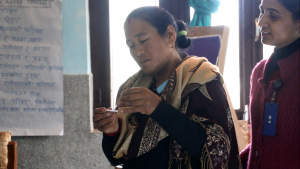 Recognising the importance of women’s participation in promoting health of the people, Government of Nepal had initiated the Female Community Health Volunteer (FCHV) Program in 1988/1989.
Recognising the importance of women’s participation in promoting health of the people, Government of Nepal had initiated the Female Community Health Volunteer (FCHV) Program in 1988/1989.
The FCHVs are the first source of contact for reproductive health services in rural communities, and they can play a major role in promotion of reproductive health, maternal health, childbirth, family planning, safe abortion and other community health services.
The flow chart below further clarifies the role of FCHVs in a community for creating a channel between women seeking an abortion and a safe abortion site.

FCHVs through BCC approaches are also helping in reduction of unsafe abortion, abortion stigma as well as gender inequality in the community.
Since the role of FCHVs is of great importance in the community for ensuring women’s right to safe abortion, we chose the FCHVs as the target group for our program. We conducted a one day sensitization program for 29 FCHVs from Nawalparasi district, Nepal.
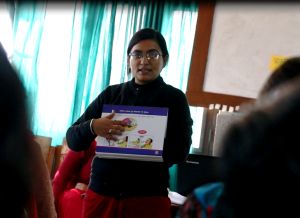 The program content included the “must know” information for FCHVs like; understanding safe abortion through gender lens and not merely as a medical procedure, safe abortion and legal condition for safe abortion services in Nepal, consequences of unsafe abortion, referral mechanism and cost requirement for safe abortion, post abortion contraceptive and its importance, stigmas and other barriers in accessing safe abortion services and the role of FCHVs in reducing them etc.
The program content included the “must know” information for FCHVs like; understanding safe abortion through gender lens and not merely as a medical procedure, safe abortion and legal condition for safe abortion services in Nepal, consequences of unsafe abortion, referral mechanism and cost requirement for safe abortion, post abortion contraceptive and its importance, stigmas and other barriers in accessing safe abortion services and the role of FCHVs in reducing them etc.
FCHVs are highly trusted in the community and can play an effective role in improving access to reproductive health information. Though the FCHVs have to manage the chores inside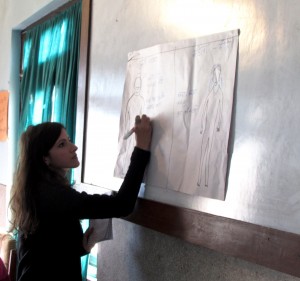 outside their homes, they are highly committed and motivated towards their responsibilities.
outside their homes, they are highly committed and motivated towards their responsibilities.
“I belong to an orthodox family where male child is given high preference. Due to the pressure from my in-laws, I was obliged to be a mother of four children. I now have 3 girls and a youngest fourth one is a boy. Today’s sensitization program was emotionally touching for me since you were mainly focused towards the issue of gender inequality,” Bhima Ranabhat, FCHV
As youth champions it was very inspiring to see the FCHVs feeling empowered during the program, for being a change agent in their community by improving the lives of women through health information and services.
This program was a great learning experience, which has motivated us to become selfless emissary of the women’s health especially safe abortion. Additionally, this small grant project has given us an insight to work with an innovative approach for improving women’s access to safe abortion services.

